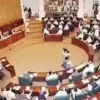WEB DESK: Recent message circulating in Urdu conveys a hardline stance: it mixes reproachful historical references, a threat to remove Afghan refugees from Pakistani soil, and an explicit pledge to strike Taliban positions inside Afghanistan should militants carry out terrorist attacks on Pakistani territory with special emphasis on the provinces of Khyber Pakhtunkhwa and Balochistan.
The statement uses historical memory (referencing external help during the Soviet–Afghan conflict and the battle of Tora Bora) to question the Taliban’s legitimacy and to remind audiences of past weaknesses. It then pivots from rhetoric to action by announcing a forced expulsion of Afghan refugees and most consequentially a promise of retaliatory military strikes against Afghan-based Taliban infrastructure that allegedly supports cross-border attacks.
Explicit threats to strike targets inside Afghanistan raise the risk of cross-border retaliation and wider military escalation between state actors and non-state armed groups. Any such actions could destabilize border areas further. A policy of mass expulsion of refugees would create urgent humanitarian needs. Refugees are a vulnerable population; forced movement raises concerns under international refugee and human-rights standards.
Threatening cross-border strikes and expelling refugees could strain relations not only between Pakistan and Afghanistan but also involve regional players (including India, which the statement references) and international organizations concerned with refugee protection and conflict resolution.
Strong nationalist messaging (“Pakistan Zindabad”) is likely aimed at domestic constituencies, signaling resolve to voters or supporters. It also risks inflaming ethnic and communal tensions, especially in border provinces directly affected by insurgent activity.
International law restricts cross-border use of force; reprisals that strike sovereign territory carry complex legal and political consequences. Mass expulsions of refugees are also constrained by international refugee law, including non-refoulement obligations that prohibit returning people to a country where they face persecution. Any state announcing such measures would face scrutiny from human-rights bodies and humanitarian organizations.
Official responses from the Afghan government, the Taliban (if they are the party addressed), and Pakistan’s civilian and military leadership clarifying whether the statement reflects formal policy or is rhetoric from a particular group.
Reactions from regional players (notably India and neighboring states) and international organizations (UNHCR, UN) concerning refugee protection and the risk of cross-border strikes.
Developments on the ground in border provinces (security incidents, displacement) that would indicate whether tensions are escalating.
The translated statement is confrontational and carries serious implications for civilians, refugees, and regional security. De-escalatory diplomacy, protection for civilians, and adherence to international legal norms would be critical paths for mitigating the risks raised by such rhetoric.
If you’d like, I can turn this into a short news article for print or web, prepare a quote-ready summary for social media, or draft a neutral press-release style version. Which format do you prefe



